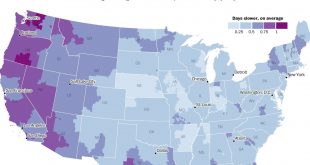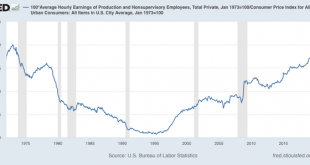Bad News About Iran And Nuclear Deal In yesterday’s Washington Post it was reported that there will be no further negotiations between the US and Iran (and other parties) in Vienna over the US and Iran rejoining the JCPOA nuclear agreement that Iran had been adhering to when Donald Trump withdrew the US from it in 2018, then reimposing economic sanctions on Iran, with Iran then starting to violate the agreement in various ways starting a year...
Read More »Reply to the USPS: The new service standards will cause geographic discrimination
Steve Hutkins at Save the Post Office, “Reply to the USPS: How the new service standards will cause geographic discrimination” The Postal Service’s plan to reduce service standards is now being reviewed by the Postal Regulatory Commission for an Advisory Opinion. On Friday, June 25, the Postal Service and several of the intervenors in the case submitted their Reply Briefs. (You can find the briefs and replies here.) Below is my Reply Brief....
Read More »In Defense of a Progressive Tax System – Redux 2021
This post is before my time of writing at Angry Bear. It does fit in nicely with the need for reasonable economics of our times and I noticed its popularity growing . The author of this piece is Kash, one of the originators of AB. This is a rehash which has seen rising popularity. If you consider when this was written, it was on the precipice of the 2008 collapse when both Wall Street and Main Street were ready to fall into a depression. While...
Read More »“The Sources of International Investment Income in Emerging Market Economies”
by Joseph Joyce “The Sources of International Investment Income in Emerging Market Economies” The Review of International Economics has published my paper on “The Sources of International Investment Income in Emerging Market Economies” in its latest issue. You can find the paper here, and this is the abstract: We investigate international investment income flows in 26 emerging market countries during the period of 1998–2015. Net investment...
Read More »Postal Service Reform May Slow Delivery of the Mail
Steve Hutkins at Save The Post Office, “How the postal reform bill may help the Postal Service slow down the mail” In August 1970, Title 39, aka the Postal Reorganization Act, created the Postal Service. The first section, 39 U.S. Code § 101, is entitled “Postal Policy.” It’s just over 400 words long, but it is probably the most frequently quoted passage in the history of postal legislation. It’s often cited in litigation, academic articles, and...
Read More »Real wages decrease sharply – at least, if you include used vehicle prices
Real wages decrease sharply – at least, if you include used vehicle prices As I pointed out yesterday, the big increase in inflation over the past few months has made the YoY change in real wages for nonsupervisory workers negative. Let’s take a little closer look. Here is a graph of wages for nonsupervisory workers taking overall inflation into account, normed to 100 as of January 1973 (its peak previous to the pandemic): Wages had...
Read More »Will A Rise in Interest Rates Lead to a New Debt Crisis?
by Joseph Joyce Will A Rise in Interest Rates Lead to a New Debt Crisis? The question of when the Federal Reserve will begin to reverse its loose policy stance continues to be a topic of widespread speculation. At last month’s meeting of the Federal Open Market Committee, its members showed a willingness to cut back on asset purchases in 2022 and to raise interest rates in 2023 but kept monetary policy on its current setting due to slower...
Read More »Open thread July 16, 2021
Socially Ambivalent Labour Time: TSV part 3, chapter 20
Socially Ambivalent Labour Time: TSV part 3, chapter 20 Marx’s discussion of socially necessary labour time in Chapter 20 of Theories of Surplus Value is notable for the fact that it comes immediately before Chapter 21, where he doesn’t mention socially necessary labour time (but the concept lingers just below the surface in the latter chapter). He talked about how piece-work is actually a kind of time work in which the piece rate is set according...
Read More »Why we’re failing to stop climate chaos
by David Zetland Why we’re failing to stop climate chaos Climate chaos (CC) is the largest threat to our collective prosperity. (Water scarcity, biodiversity loss, increasing vulnerability to viruses and bacteria are a few more.) But “we” (citizens of rich countries) are having a hardER time understanding and addressing CC due to a few strategic mistakes, i.e., Most discussions of impacts focus on 2100, which is too far away from our time...
Read More » The Angry Bear
The Angry Bear



